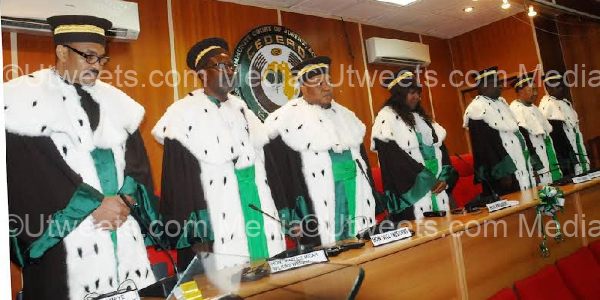The Economic Community of West African States (ECOWAS) Court of Justice has ordered the Federal Republic of Nigeria to compensate Oluwatimilehin Adebayo with N5 million for violating his right to freedom from torture. ...READ THE FULL STORY FROM SOURCE ...READ THE FULL STORY FROM SOURCE
In its ruling, the regional court also directed Nigeria to conduct a “prompt, impartial, and effective” investigation into the alleged torture of Adebayo by police officers in Ogun State.
Meanwhile, the court called for the prosecution of those found culpable.
The case, filed under suit number ECW/CCJ/APP/47/23, detailed claims of severe physical abuse inflicted by police operatives.
According to Adebayo, officers subjected him to inhumane treatment, including beating him with the handle of an axe and restraining his limbs with chains tied to a pole.
However, the actions allegedly caused him physical injuries, including trauma to his scrotum, and left him with significant psychological distress.
Adebayo sought redress from the ECOWAS Court, requesting compensation for the harm he endured. In response, the Nigerian government contested the court’s jurisdiction, arguing that the case was statute-barred as it was filed beyond the three-year limitation period stipulated in the court’s rules.|GOD WILL JUDGE THEM: 18+ SEE. VIRAL VIDEO. HOW BOKO. HARAM. $L4UGHTERED. HUMAN .BEINGS LIKE. CHICKENS|.
The court, however, dismissed Nigeria’s objections, affirming its jurisdiction to hear the case. It found Nigeria liable for failing to uphold Adebayo’s fundamental human rights and awarded the monetary compensation as redress.|GOD WILL JUDGE THEM: 18+ SEE. VIRAL VIDEO. HOW BOKO. HARAM. $L4UGHTERED. HUMAN .BEINGS LIKE. CHICKENS|.
The News Agency of Nigeria reports that Nigeria argued the court lacked jurisdiction to hear the case, contending that doing so would amount to reviewing a matter already decided or pending (sub judice) before a Nigerian court.
Delivering the judgment, Justice Dupe Atoki, who read the decision of the three-member panel, dismissed Nigeria’s preliminary objections.
She ruled that the court had jurisdiction to hear cases involving human rights violations under its mandate.
Justice Atoki clarified that the statute of limitations under Article 9(3)(b) of the Court’s Protocol does not apply to human rights violations, making the case admissible.
The court found that the victim’s mistreatment amounted to torture, violating Article 5 of the African Charter on Human and Peoples’ Rights, to which Nigeria is a signatory.
“The torture was intentional and aimed at coercing the applicant into signing a pre-written statement,” the court stated.
As a result, the court ordered the Nigerian government to pay compensation of several million naira to the victim for the violation of his right to freedom from torture.
However, it dismissed the applicant’s claim that his right to a remedy was violated, citing a lack of evidence that he had formally reported the abuse to the appropriate authorities..…Read -T.he.Full_Article.Here.



